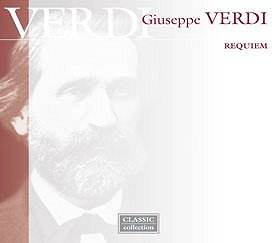With recordings of this work proliferating in
the catalogue, across all price ranges and featuring renowned
soloists and conductors, readers may want to question whether
they want to give this issue, from unknowns, shelf room. Opera
lovers will note that the ‘Sofia National Orchestra and Chorus’
have featured on many distinguished recordings under the baton
of the likes of Karajan, Cluytens and Semkow. Readers might also
recall, that even in the darkest days of communist suppression,
great voices emerged from a country with a rich musical tradition.
The orchestra and choir may or may not be the ‘National’, there
are no notes to even indicate recording dates or venue, but certainly
the choir on this recording is one of its greatest strengths.
Whilst there are no soloists of the quality of Christoff or Ghiaurov,
this is, nonetheless, a performance and recording whose merits
are such as to justify a single disc space at least on my shelves!
The opening ‘Requiem aeternam’ (tr.1) is so hushed
that one barely notices that the performance has started. The
conductor maintains that control as the sound from the first string
chords through to the hushed entry of the choir. The part singing
is strong with slightly reedy tenors, sonorous basses and vibrant
female voices soaring out. All the while Marinov shapes and phrases
the vocal lines with a sympathetic feel for the Verdian pulse.
This is vital as the ‘temperature’ rises with the entry of the
soloists, the tenor and bass clearly enunciating their words and
the soprano’s voice taking wing above the line. In the ‘Dies irae’
(tr.2) the choir articulates with precision and the sound is captured
without congestion. The trumpets in the ‘Tuba mirum’ (tr.3) are
set a little too far back and would have benefited from greater
immediacy. In the hushed chords of ‘Mors stupebit’ the bass, again
a little too far back, reveals a steady well covered tone. The
mezzo’s creamy voice, with a quick, but not unattractive, vibrato,
is heard to good effect in the ‘Liber scriptus’ (tr.4), where
I am again most impressed by the choir and the conductor’s taut
but well shaped control of the proceedings.
The remaining sections of the Requiem allow for
a more measured evaluation of the soloists as they sing in solo,
duet and with the choir. The ‘Ingemisco’ (tr.8) is a famous tenor
‘tour de force’. Here, Roumen Doikov, exhibits a strong but rather
dry tone with a touch of nasality; he is also inclined to chop
the ends of phrases. That being said I prefer him to Philips’
latest offering with Bocelli’s constricted tone lacking any appeal!
In the ‘Confutatis’, (tr.9) the bass of Emil Ponorski is strong
and generally steady but somewhat lean of tone in the upper reaches
of the voice. Reliable though he is, you wouldn’t breathe his
name alongside compatriots Christoff (under Serafin on Testament)
or Ghiaurov (on Giulini’s famous 1963 recording, now a rather
dated ‘GROC’, or for Abbado on his 1980 recording for DG). In
the ‘Hostias’ (tr.11, not separately tracked from the ‘Domine
Jesu’) the soprano’s strong, vibrant, well-coloured middle voice
is heard to good effect. Her tone does, however, become thinner
as she floats the more ethereal notes above the stave. Sutherland
(on Solti’s 1967 recording) and Studer (on Muti’s second EMI recording)
are stronger here, but then both those versions are on two full
priced discs. The true test of the soprano comes in the ‘Libera
me’ (tr.15) which must be started with agitated attack before
the ‘Dies irae’ returns and she must then reprise the ‘Requim
aeternam’ before the outcry that launches the choral fugue. Heft,
steady line and vocal intensity are required here; Daniela Nedialkova
gives it a good shot without equalling some more famous names
whilst matching others for meaning. She pleads for deliverance
with dramatic effect using strong vibrant chest notes as she and
the choir subside to Verdi’s atheistic view of redemption.
This performance has a dramatic and dynamic tautness
that extends throughout to give a satisfying thought-through whole
without sounding over-driven and with the benefit of fitting on
one disc. It is a pity no recording details are given except that
it is DDD. The sonics are set at a lower level than some and a
couple of touches on the volume button gives a greater immediacy.
Listening with some care to the recording quality and characteristics,
I would speculate that it is of fairly recent origin. There is
a little added bloom around the solo voices whilst the orchestral
sound is open and the choir, set further back, are caught, as
I have noted, without congestion. I have paid a lot of money to
hear this work over the years, often featuring ‘name’ conductors
and soloists. Not many have given me as much pleasure as this
performance.
Robert J Farr

![]() Daniela Nedialkova, (soprano).
Ivanka Ninova, (m.soprano). Roumen Doikov, (tenor). Emil Ponorski, (bass)
Daniela Nedialkova, (soprano).
Ivanka Ninova, (m.soprano). Roumen Doikov, (tenor). Emil Ponorski, (bass)
![]() CLASSIC COLLECTION 99837
[78.50]
CLASSIC COLLECTION 99837
[78.50]